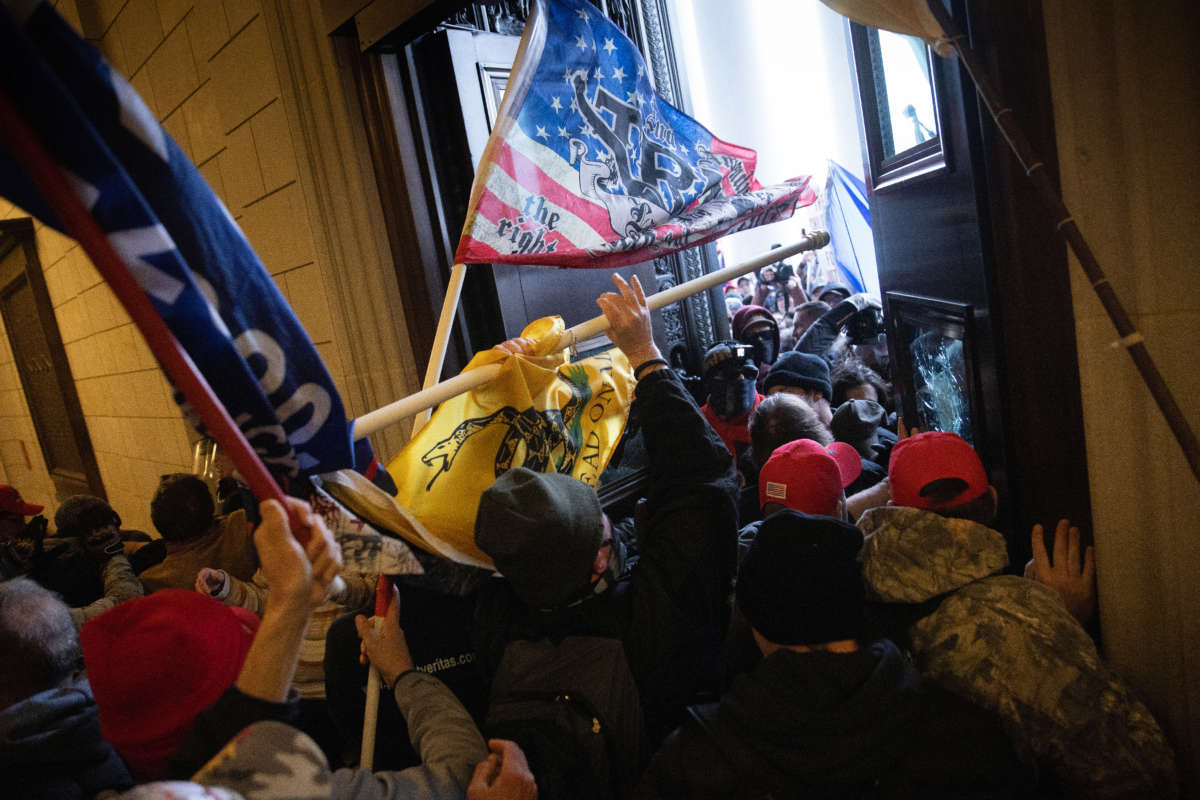Support justice-driven, accurate and transparent news — make a quick donation to Truthout today!
A previous draft of the resolution that formally censured Reps. Adam Kinzinger (R-Illinois) and Liz Cheney (R-Wyoming), which was composed by the Republican National Committee (RNC), vastly downplayed the attack on the U.S. Capitol building last year, describing the breach of the Capitol by a mob of Trump loyalists as “non-violent.”
Although the final version of the censure document removed that descriptor, the document’s depiction of the Capitol attack still sparked criticism.
Last week, the RNC voted to adopt a resolution condemning Kinzinger and Cheney for their involvement in the House select committee investigating the attack; the resolution accuses the commission of persecuting Trump loyalists and refers to that day’s violence as “legitimate political discourse.” But an early draft of the censure resolution suggests that the RNC wanted to downplay the events of January 6, 2021, even further.
According to The New York Times, which obtained a copy of the early draft, the RNC was preparing to describe the Capitol attack as “ordinary citizens engaged in nonviolent and legal political discourse.”
Republicans’ positions on the Capitol attack have shifted numerous times over the past year. Initially, most GOP lawmakers and party members condemned the Trump loyalists who breached the Capitol – but gradually, leaders like RNC chair Ronna McDaniel and House Minority Leader Kevin McCarthy (R-California) backtracked their initial disapproval of the day’s events, perhaps influenced by former President Donald Trump’s repeated defense of his loyalists’ actions.
Still, there appears to be a noticeable schism within the Republican Party, as some Republican lawmakers have denounced the censure resolution’s language as inaccurate and flawed. Sen. Mitt Romney (R-Utah) – McDaniel’s uncle – is among those who have voiced their disapproval of the resolution’s wording.
“It could not have been a more inappropriate message,” Romney said, adding that he has “expressed [his] point of view” to McDaniel through text messages.
Senate Minority Leader Mitch McConnell (R-Kentucky) has also spoken out against the language used in the censure, breaking away from McCarthy, his counterpart in the House.
“We all were here. We saw what happened,” McConnell said in a recent statement. “It was a violent insurrection for the purpose of trying to prevent the peaceful transfer of power after a legitimately certified election, from one administration to the next. That’s what it was.”
Several Democrats condemned the document’s characterization of the Capitol attack.
“There was no ‘legitimate political discourse’ occurring on Jan 6,” said Rep. Ruben Gallego (D-Arizona). “What occurred was a mob, incited by the Big Lie, who attacked our democracy.”
The RNC’s censure of Kinzinger and Cheney was also rebuked by members of the January 6 committee.
“Lincoln’s party of ‘liberty and Union’ is now Trump’s party of violence and disunion,” Rep. Jamie Raskin (D-Maryland) wrote on Twitter this past weekend.
Press freedom is under attack
As Trump cracks down on political speech, independent media is increasingly necessary.
Truthout produces reporting you won’t see in the mainstream: journalism from the frontlines of global conflict, interviews with grassroots movement leaders, high-quality legal analysis and more.
Our work is possible thanks to reader support. Help Truthout catalyze change and social justice — make a tax-deductible monthly or one-time donation today.
